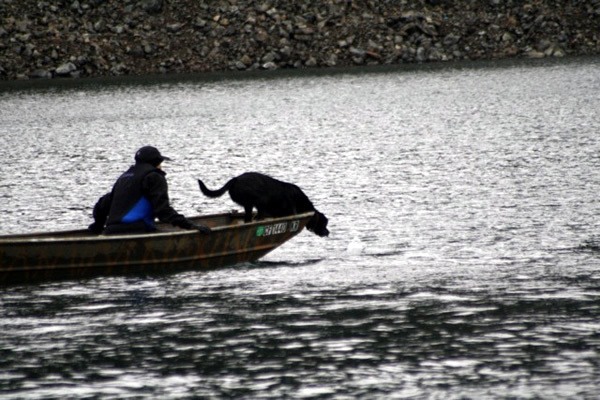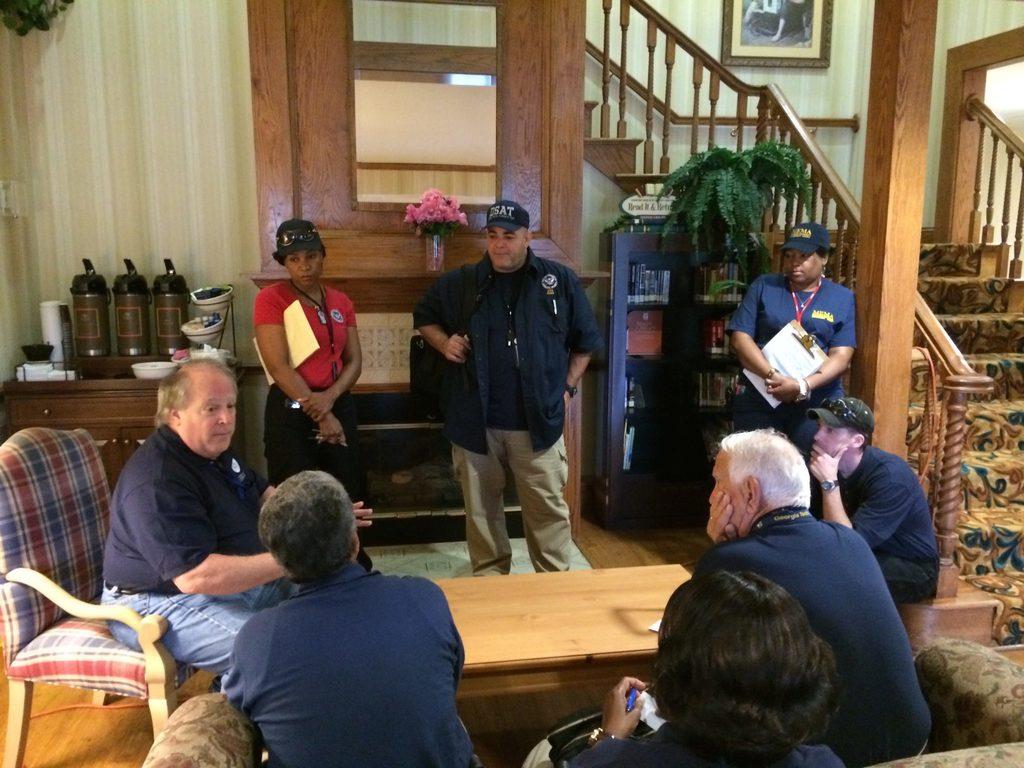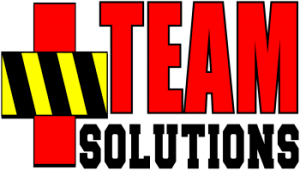Many years ago, an overly ambitious jet-skier that couldn't swim, wasn't wearing a life-jacket, and had been reportedly drinking beer like Cooter Brown drowned in a nearby lake.
He was last seen flailing about in the water by the hot water run-off from a nearby power plant - creating a quirky and swirling current - so his body could have been transported anywhere.
Divers did not locate him where he was believed to have gone under so they called out my search team to help locate him.

K9 searching from a boat
In the inevitable scuttlebutt of where he could have ended up, a young fireman made an offhanded comment that a couple of years prior to the current drowning, another victim went under in nearly the same spot and ended up resurfacing in a cove clear across the lake.
- The problem was that the young fireman didn't share his memory officially nor did he say anything until the second full day of the search.
Alas, the drowning victim was eventually recovered 2 days later right where the previous victim was located years earlier.
- What would the results have been if we all knew that people that drown in area "X" tend to drift and resurface near area "Y"?
- What would the impact be to the family of the victim, the other lake visitors, the responding agencies?
That firefighter's knowledge about prior drowning victims was critical to know, but it was not institutionalized.
It required that at least one of the responders from year's back be present to recall their experience. And of course when those with the requisite knowledge are not available, that knowledge is no longer available either.
- Which ultimately means we have to re-learn each lesson over and over and over.
Sound familiar?
Institutional knowledge is like common knowledge ... it's neither institutionalized nor common unless we takes steps to make it so.
"Institutional knowledge is like common knowledge ... it's neither institutionalized nor common unless we takes steps to make it so." ~Mike McKenna #leadership
The simplest way to make knowledge institutional is to debrief every response, every crisis, every planned and unplanned event.
For better or worse, that requires leadership at the top to influence that 'change in how business is done.'

Pearl, MS, May 11, 2014 -- A Disaster Survivor Assistance teams meets at a local motel before going out into the field.
Debriefings don't need to be long and drawn out but they do need to be consistent and thorough enough to transcend the trap of having to rely on anyone's collective memory.
Power Tip - "The Huddle"
It is common among bureaucratic organizations to get stuck on the presumed 'formality' of debriefings.
While anything written down could surely be subject to legal scrutiny, the core purpose of the debriefing should not be overlooked.
If you find your organization getting tripped up over the mostly-meaningless details of a debriefing, try this:
- Grab a pen and paper.
- Call a "huddle" with the key players.
Gather around a table, a tailgate or a lamp post and purposely capture the key findings.
Trust me, a simple "huddle" can do more for improved communication than dozens of overly-managed and scripted formal meetings.
After collecting the results, they need to be tagged, indexed or otherwise incorporated into future plans and operations through documentation in manuals, teach-ups, and other forms of ongoing training.
- We have policy manuals, on-boarding manuals and reference manuals for operating the coffee maker ... so why not have a manual (living document) for referencing previous responses?
This process forms a repeatable cycle of communication and improvement.
And repeatable cycles create institutional memories.
Your Turn:
Browse and download the available communication skills guidebooks below:
OR ...
Level up your briefing and debriefing skills by enrolling in my course:
Briefing and Debriefing for Better Communication
Specifically designed for crisis leaders to improve their briefing and debriefing outcomes. Click the link to learn more.
